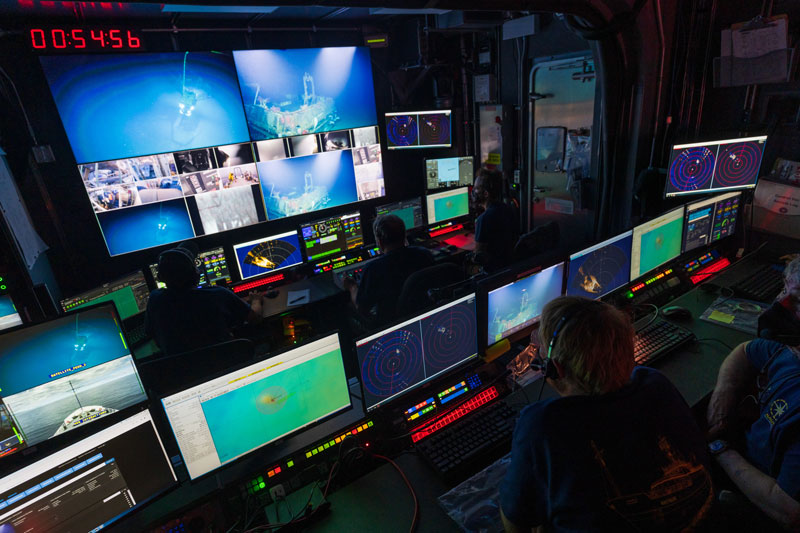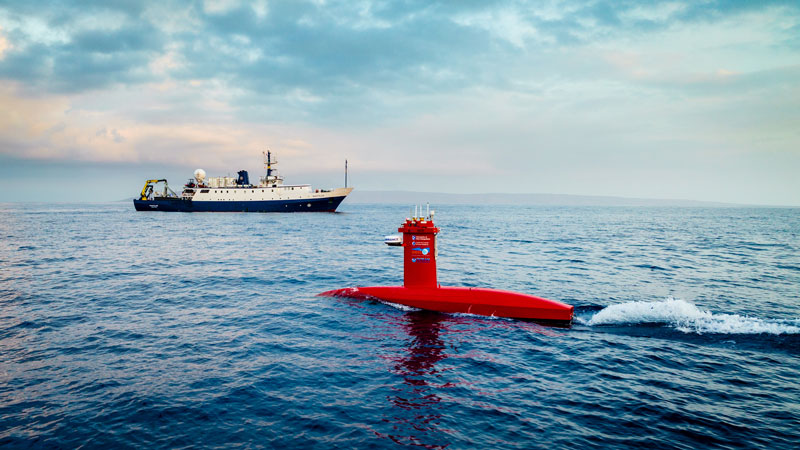NOAA Ocean Exploration Cooperative Institute Renewed for Five More Years
The cooperative institute will continue its mission to explore the unknown ocean.
The NOAA Ocean Exploration Cooperative Institute (OECI), which brings together multiple institutions and organizations to develop new technologies, explore the vast U.S. submerged territory, and engage and train the next generation of ocean explorers to build the blue economy workforce, was recently renewed for another five years of operation. The OECI was established in 2019, and is led by University of Rhode Island’s Graduate School of Oceanography (URI-GSO), and includes Woods Hole Oceanographic Institution (WHOI), University of New Hampshire (UNH), University of Southern Mississippi (USM), and the not-for-profit Ocean Exploration Trust (OET). By working together, these globally recognized organizations are maximizing our ability to understand the deep sea in new and exciting ways.

The multi-institution science and operations team direct remotely operated vehicle Hercules from the Exploration Vessel Nautilus control room. Image courtesy of Ocean Exploration Trust. Download largest version (jpg, 4.42 MB)
"The renewal of the OECI is a great reflection of the tremendous experience, creativity, and productivity of each of the affiliated institutions, but even more, it speaks to the tremendous benefit of having all of these institutions working cooperatively to help NOAA achieve its mission," said OECI Executive Director Dr. Adam Soule.
In its first five years of operation, the OECI has shown incredible productivity in ocean exploration, mapping over half a million square kilometers (over 190,000 square miles) of seafloor, conducting over 200 uncrewed systems deployments, and collecting nearly 3,000 hours of seafloor video imagery. "With so much of our U.S. ocean territories still unmapped and unexplored, the data acquired by the OECI are critical to helping NOAA Ocean Exploration meet its mission to expand our knowledge of the unknown ocean, making amazing new discoveries along the way," said Jeremy Weirich, director of NOAA Ocean Exploration. "Additionally, OECI contributions support a range of NOAA and other federal priorities, including restoration of the Gulf of Mexico’s mesophotic deep benthic communities, offshore wind leasing, and conservation within U.S. marine national monuments and sanctuaries."
To carry out this work, the OECI utilizes well-established ocean exploration technologies and platforms (e.g., OET’s Exploration Vessel Nautilus and remotely operated vehicles) and develops, advances, and deploys new technologies to improve the pace and fidelity of ocean exploration activities. These innovative technologies include the uncrewed surface vessel DriX operated by UNH, the autonomous midwater vehicle Mesobot operated by WHOI, the autonomous Deep Autonomous Profiler operated by URI-GSO, and autonomous underwater vehicles Eagle Ray and Mola Mola operated by USM, as well as many other existing and emerging sensors, tools, and techniques. "Just as no single institution can fully and adequately explore the ocean, no one vehicle or platform supplies all the functionality we need to surmount the challenges the ocean presents," said Dr. Rick Murray, Deputy Director and Vice President for Science and Engineering at the Woods Hole Oceanographic Institution. "The Ocean Exploration Cooperative Institute is bringing us together as a community and leveraging the strengths of our many tools and techniques to map and characterize the nation’s vast ocean territory."

Exploration Vessel Nautilus and the autonomous surface vessel DriX map and survey in tandem during an expedition. Image courtesy of Ocean Exploration Trust. Download largest version (jpg, 4.18 MB)
The activities of the OECI also enhance local and national economies by training students for careers in the Blue Economy and supporting industry partnerships that help the OECI and NOAA achieve advances that benefit ocean exploration and beyond. The blue economy is estimated to have contributed $476 billion to the nation's GDP in 2022 and is expected to grow to the trillions in the coming decade. "A prime example of this is the close collaboration between UNH and Exail, manufacturer of the uncrewed vehicle DriX, which has led to the establishment of a new Marine Autonomy Innovation Hub, bringing jobs, manufacturing, and student training opportunities to New Hampshire." said Dr. Larry Mayer, OECI co-PI and Director of the UNH Center for Coastal and Ocean Mapping.
The OECI has a commitment to building capacity for ocean exploration and a workforce that is as diverse as the nation. To that end, the OECI supports an internship program led by USM that engages Tuskegee University (TU) and Jackson State University (JSU), two Historically Black Colleges and Universities, and their students in OECI projects, research expeditions and technology innovation. "USM recognizes that society benefits from innovation that can only emerge from distinct perspectives," said Dr. Leila Hamdan, OECI co-PI and Associate Vice President for Research at USM. "Together with JSU and TU, we operate as a force multiplier to grow an exploration community that is exemplified by welcomeness and inclusion of people and ideas, and that can increase the competitiveness of our students for rewarding careers in ocean science, engineering, hydrography, and beyond."
Engagement activities of the OECI are underpinned by the OET telepresence-enabled livestreaming of all ocean exploration activities on E/V Nautilus, reaching millions of people worldwide every year, with support from URI-GSO’s Inner Space Center. "Increasing the public’s participation in ocean exploration is a core tenant of the OECI. With millions reached in the first five years, we are looking to exceed those numbers through new captivating technologies and faster access to our deep sea data." said Jason Fahy, OECI Associate Director.
Additionally, the OECI is invested in efforts to advance equity in ocean exploration. Expeditions are co-designed to reflect the broad global interests in understanding the ocean, alongside local Pacific Island community priorities and science management needs. "At OET and within the OECI, we recognize the invaluable role that Indigenous knowledge plays in deepening our understanding of the ocean," said Allison Fundis, OECI co-PI and Executive Vice President at OET. "By fostering lasting partnerships with local and Indigenous communities, we not only expand our scientific perspective and the expertise of our expedition teams through the participation of students, educators, scientists, and cultural experts but also honor the centuries-old stewardship of the waters we explore as guests."
In the coming years, the OECI will continue to conduct ocean exploration in the central and western Pacific Ocean with E/V Nautilus, as well as conducting exploration activities in the Gulf of Mexico, Great Lakes, and Atlantic Ocean with a multitude of NOAA partners. The OECI will seek to advance new technologies to operational states that broadly benefit the ocean enterprise. This will include an emphasis on increasing capacity for deep-sea observations through the use of autonomous systems, development of software to enable remote science and engineering, and developing and operationalizing new uncrewed systems for mission-specific objectives. Through all of these activities, students will gain training and experiences that will prepare them for future ocean exploration and blue economy careers.
Published September 25, 2024